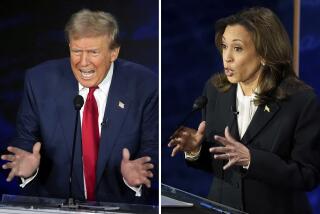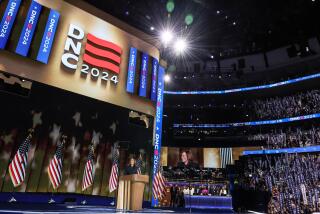Bush Scoffs at Critics, Calls Clinton a ‘Whiner’ : Campaign: GOP attack is termed a ‘gentle broadside.’ The tone suggests that President will keep pressure on.
- Share via
SPRINGFIELD, Ill. — After three days of pummeling Bill Clinton’s values and record, President Bush on Sunday scoffed at criticism of the hard-edged tactics as a sign that the Democratic nominee is inclined to “whine and complain.”
“The American people don’t want that,” Bush told reporters at the Illinois State Fair here. He portrayed the Republican attack as “a little, gentle broadside.”
The tone of Bush’s comments sent a new signal of his determination to keep the pressure on Clinton, despite the concern of some top Republicans that he is risking a political backlash. Only hours earlier, Cabinet member Jack Kemp sounded a warning about continued use of tactics that emphasized the negative and the personal.
After noting pointedly to evangelists Saturday night that the Democrats had not found room to include the word God in their platform, Bush insisted Sunday that he has not “begun to fight yet, I haven’t.”
“Nine months of Bill Clinton hitting me and he gets hit back, and mildly . . . and he starts to whine and complain,” Bush said.
Clinton said Sunday that Bush had invoked a “deeply offensive” political ploy in questioning Democrats’ commitment to God and he said that Republicans should be ashamed of their “off-the-wall” attack linking his values to those of Woody Allen.
The astringent tone of the GOP offensive has been the subject of debate since last week’s Republican National Convention unleashed a series of attacks on Clinton and on a “culture” that he allegedly represents.
Appearing on a television interview show to defend Bush’s new tax plan, Kemp, secretary of Housing and Urban Development, said that he believes the campaign faces a “danger” of alienating important voter groups, particularly working women, if it continues attacks targeting Clinton’s wife, Hillary, or suggesting that the Democratic ticket reflects lesser values or is the enemy in a cultural war.
“I do not want to see a religious war, a jihad, or some type of battle that splits America,” Kemp said on an NBC-TV show. “You can win an election, but you cannot govern the country by dividing the American people.”
He acknowledged that not everyone in the GOP leadership agrees with this assessment, saying of GOP Chairman Richard N. Bond: “I’m sure he’s a little bit upset with me.” Kemp’s concerns were underscored, however, by Sen. John H. Chafee (R-R.I.), who in a separate interview rejected attacks in a convention speech on gays and lesbians by former GOP presidential candidate Patrick J. Buchanan.
“I don’t believe in bashing any group, gays or lesbians or whoever,” said Chafee on a CNN talk show. “Pat Buchanan’s not running for President of the United States. George Bush is.”
In another sign of the campaign’s determined pugnaciousness, campaign chairman Robert M. Teeter declined to distance the Bush camp from a suggestion by Rep. Newt Gingrich (R-Ga.) that the Democratic platform embraces the cultural values of filmmaker Allen, who has acknowledged having an affair with the adoptive daughter of his longtime lover, Mia Farrow.
“Newt’s rhetoric was Newt’s,” said Teeter. “I’m not going to get into whether I approve or not.”
Teeter also defended Bush’s reference to the absence of the word God in the Democratic platform, saying that the comment illustrates the difference Democrats and Republicans place on religious values.
After weeks of fretting that Bush had held his fire too long, White House aides were delighted Sunday with the shift in tactics that has transformed the race into a slugfest. They defended Bush’s attacks as necessary to expose what Press Secretary Marlin Fitzwater described as Clinton’s liberal record.
“It’s incumbent on us to make sure that he doesn’t get away with trying to sound like Bush,” said Fitzwater. “The President is energized and up for it all. It’s the best week clearly that we’ve had.”
In private conversations, Bush strategists argue that they have little choice but to mount a full-bore assault. With Bush’s negative ratings hovering near 50% and nearly four in five voters believing that the nation is on the wrong track, they profess little hope that such an obstacle can be overcome by Election Day.
Instead, they describe their mission as raising enough doubts about Clinton that even voters who feel negatively toward Bush and the course he has charted can be persuaded to vote for his reelection.
Several leading Democrats said Sunday that they are convinced the tactic will backfire.
“Unless I’m wrong about the intelligence level of the American voter, if the Republicans don’t stop the insults and the stupidity and start getting on the stage and debating Clinton, get on those issues and start making sense, they are going to get wiped out in this election,” said Democratic Gov. Mario M. Cuomo of New York on an NBC-TV news show.
House Speaker Thomas S. Foley (D-Wash.) accused Bush of turning over the Republican Party to Buchanan and other leaders of the political and religious right. “It’s unfortunate to move away from the mainstream in a dramatic and radical way,” he charged.
GOP strategist Teeter said that the main focus of the campaign will continue to be to highlight the differences between the candidates on issues, such as the economy.
Bush is calling for an across-the-board tax cut and parallel reductions in government spending, and Clinton is advocating expanded programs to generate jobs and an increase in taxes on the wealthy.
Bush’s plan has been criticized for its lack of details and Kemp tried to use his standing as a leading spokesman for conservative economic policy to mobilize support for it. The key to cutting taxes and spending without ballooning the national debt is to create new revenue for government by expanding the economy, Kemp said.
“You cannot fix the budget until we fix the economy and the President has pledged to fix the economy, get America moving again, create more jobs,” said Kemp, who acknowledged that he still has his own differences with Bush’s economic plan.
Cuomo played a similar role Sunday in trying to marshal support for Clinton’s economic program. He characterized Bush as the candidate whose tax plan would help the wealthy and said that Clinton would invest tax money in roads, bridges and job training that would stimulate jobs and free enterprise.
Jehl reported from Springfield, Ill., and Frantz reported from Washington.
More to Read
Get the L.A. Times Politics newsletter
Deeply reported insights into legislation, politics and policy from Sacramento, Washington and beyond. In your inbox twice per week.
You may occasionally receive promotional content from the Los Angeles Times.










